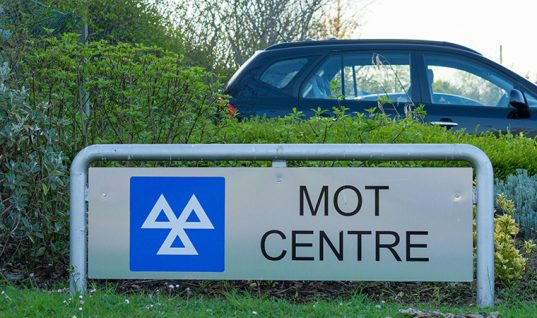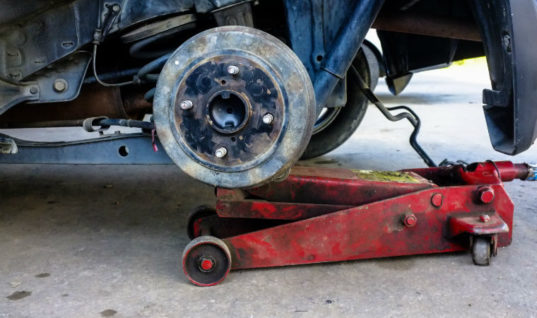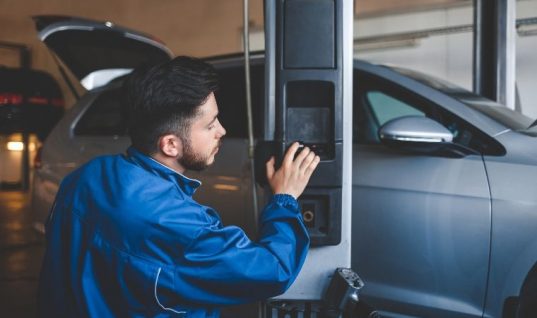At Automechanika 2025, we jumped in the Ben camper to chat with Ellen Plumer – Head of Outreach and Marketing at Ben and Rebecca Pullan – MD at Carmaster Garage, about the importance of mental health among the independent garage community and the industry as a whole.
In partnership with The Motor Ombudsman, Ben has recently launched a new guide called Steer, which you can download and read for free here. The aim is to help both employees and employers foster a positive and open mental health-aware environment.
It’s packed full of helpful information and is well worth a flick through on a coffee break.
Rebecca, The ‘Steer’ guide highlights that pressures on mental and physical health are a significant concern for nearly half of vehicle repair businesses. How does your garage currently support the wellbeing of your team, and how do you plan to utilise ‘Steer’ or other resources to foster a more open and supportive environment for mental health?
Over the last couple of years, we’ve had Ben to the workshop, we’ve had a nurse too, he’s the nicest guy and has such a lovely manner about him. We give our staff free food in the staff room, and it seems that after every visit, the fruit vanishes for a while!
We just try and really look after the team we have. One of our girls is a level three in mental health support, and we’ve helped some of the team with wellbeing training too. We want to keep the staff we have, so we take our time to understand problems and to be there for them.
The ‘Steer’ guide indicates high levels of stress and anxiety among automotive workers. How are these industry-wide challenges impacting your ability to attract and retain skilled technicians and front-of-house staff?
We always try to advertise our link with The Motor Ombudsman through our social media and website. I think that link probably does help us attract new talent; the TMO definitely brings that trust by having that relationship.
But staff will always move on, but whenever we see an ex-employee they always come and say hi, we always try and take care of our team more than most others would I feel. And the boys always need a bit more of a hand. Men just don’t like to talk about their problems as much, you know.
Ellen, the ‘Steer’ guide has just been launched. What specific mechanisms or outreach strategies will Ben employ to ensure that this guide reaches the broadest possible audience of automotive businesses and workers across the UK, beyond just those affiliated with The Motor Ombudsman?”
One of our key targets for the next five years is to raise awareness. Everything we do is focused on that. Currently, only 1 in 5 in the industry is aware of our services and the things we provide. People can’t fundraise for us if they don’t know about us! And they can’t come to us if they don’t know we exist. So Steer is a new, great way to work with the industry to help raise awareness of the services we provide and the importance of health and wellbeing within the industry.
Ben’s survey highlighted stress, poor sleep, and anxiety as top health issues, with figures higher than the national average. How do these findings inform Ben’s ongoing support services and priorities for the automotive workforce, particularly given rising financial pressures?
The survey results aren’t at all surprising to us; they’re pretty consistent, and we’ve seen some flex over the years in the challenges people are facing. But they generally line up with what we’re seeing within the industry and wider communities, like financial pressures and stress related to that. Interestingly, sleep came up more this year, and it’s whether that balance is if people are sleeping less because they’ve got more pressure or stress or are they more stressed because they’re sleeping less. So, answering the questions informs us how we can best support the industry and the pressures facing it.
Mental health is the biggest issue within the automotive industry, but mental health rarely comes on its own. There are always contributing factors. So things like Steer that support people with their mental health, and employers to support their employees, should then support the wider wellbeing wtihin the industry.
This partnership with The Motor Ombudsman is a significant step. Are there plans for further collaborations with other industry bodies or larger automotive companies to expand the reach and depth of mental health and wellbeing support available to the automotive workforce?
My team focus on the awareness target, we also support fundraising and the impact. But like I said, people can’t come up to us if they don’t know about us. I want Ben to be front of mind. So if you think, where do I go for help in the automotive world, you go to Ben. That’s the position we want to get our services in. We can’t do that without the industry, though; we aren’t the solution. The industry is the solution. While we can provide the safety net of our services, the industry has to use us and work with us to be able to provide that.
Beyond the initial launch, how does Ben plan to measure the effectiveness and impact of the ‘Steer’ guide in encouraging businesses to recognise and support employee mental health challenges within the automotive sector?
We’ll constantly measure this. This will be part of our impact goals, and it will make up part of our awareness goals. So campaigns like this with The Motor Ombudsman and the Steer campaign, we will measure how many people have picked up on it, how many mentions on social, and who shares it. We’ll use it as a tool to raise that awareness, and we’ll keep mentioning it, so it’s great for the TMO members and customers, but this is a tool that can be used across the industry. Once people find useful information, they share it. But once you know about Ben and want to be part of helping us, it is helping us to raise awareness. Sharing your stories and sharing how Ben helped you are some of the best things you can do to support us.








